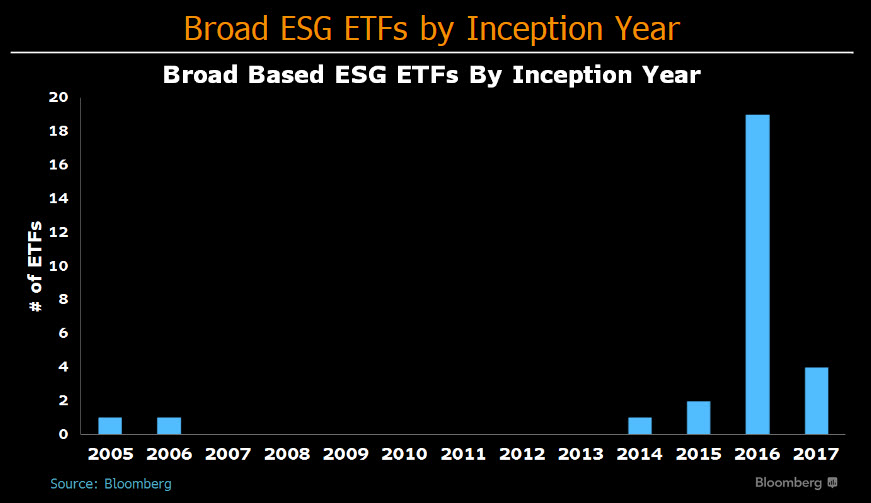Australia's experience shows true-to-label ESG funds win assets more quickly than those that take ESG less seriously.
One of the defining themes of asset management the past five years has been the blooming of environmental and social governance funds. These are funds that invest - or at least claim to - in companies that do the right thing by people and planet. And give people a chance to invest in a way that's consistent with their worldview.
But for all the new ESG funds going up, they're struggling to attract money.
"ESG is a very popular area, at least in terms of media attention. I have a ratio I keep where I look at media hype to assets," said Eric Balchunas, an exchange-traded funds researcher at Bloomberg.
"Something like the iShares Russell 2000 ETF scores very low on that: they get a lot of assets but no media. On the opposite end is ESG. They get a lot of media but no assets."

[caption id="attachment_3019" align="alignnone" width="871"] Source: Eric Balchunas, Bloomberg[/caption]
Low volatility ETFs, Balchunas points out, are only one small part of the smart beta ETF universe. Yet assets in low volatility ETFs dwarf those in ESG, despite receiving a fraction of the media coverage.
Why no assets for ESG funds?
There can be many reasons offered for the mismatch between hype and assets collected by ESG funds.
One likely reason is the lack of any regulator-backed definition of ESG. As the Financial Times once put things: "[ESG] feels more like a freewheeling movement with index providers, investment managers, pension fund executives and others making discretionary decisions."
The lack of a clear definition can leave investors confused about what's going on. Indeed, in MSCI's index factory there are more than 500 ESG indexes, tailored to fit all kinds of definitions. And if investors do not have a clear idea of what they're getting they're unlikely to invest.
Another - perhaps more significant - reason is possibly the mixed evidence on ESG funds' performance. While ESG investing may give an outlet for investors to reflect their worldview, investors want their investments to perform. Despite being heavily studied, there is no expert consensus on whether ESG funds perform. Indeed, there's disagreement on what the consensus is.
On the sceptics' side, a 2016 study by Dutch academics published in the influential Journal of Business Ethics found that "socially responsible investing does not yield significant positive risk adjusted returns." On the advocates' side a 2015 review, written by scholars at the University of Hamburg and Deutsche Asset Management, which could well be the largest review of the field ever conducted, found: "the business case for ESG investing is empirically very well founded."
But the final and most simple reason ESG funds fail to snare assets might be that most ESG funds just aren't ESG.
Here, Australia may offer something of a pointing finger and an example of how ESG can succeed going forward. In Australia, there are two ESG ETFs that give exposure to Australian companies.
One of these funds - we'll call it ETF 1 - looks quite like a plain old ASX 200 tracker. It says it's ESG, but investors could possibly wonder, 'is it really?', given that its top holdings are the big four banks, just like most non-ESG funds.
The second ETF is BetaShares Australian Sustainability Leaders ETF (FAIR), an ESG fund that might be considered more true-to-label. FAIR removes banks, mining companies and other so-called corporate baddies from its index. And invests, as it says on the tin, only in companies that are not part of those industries.
It is interesting to see how ETF 1 and FAIR have compared when it comes to collecting assets. ETF 1 has been around for more than three years while only bringing in $67m. FAIR, by contrast, has brought in $78m in three months.
The difference in assets - and the speed with which they've been gathered - probably has little to do with the marketing budgets or sales firepower of the companies that run these funds. The provider of ETF 1 is a global multi-billion dollar asset manager that can afford to spend on marketing and distribution. It also has a high level of brand recognition, just like BetaShares does. So why the difference?
"It's because our funds are very much 'true to label'," says Ilan Israelstam, co-founder of BetaShares, explaining why FAIR has fared so well.
"There are a number of other ESG-oriented funds out there, but to date none on the ASX would be considered by most investors as 'true to label' like we are."
And he could well be right. Many, if not most, ESG funds around the world often take the ESG label less seriously than they perhaps could. And the success of FAIR might offer a way forward.



